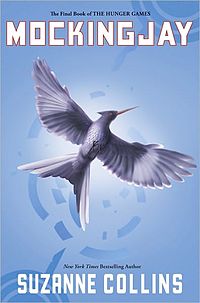Is Fiction Killing Hope?
 Young Adult fiction is dark, one writer recently said in a prominent periodical. And few can deny the popularity of monster, dystopian, or post-apocalyptic stories. Television is following the trend with shows sporting such happy titles as Grimm and Revenge.
Young Adult fiction is dark, one writer recently said in a prominent periodical. And few can deny the popularity of monster, dystopian, or post-apocalyptic stories. Television is following the trend with shows sporting such happy titles as Grimm and Revenge.
The end of Suzanne Collins’ Hunger Games trilogy, a popular series now going to the big screen, seems to illustrate the movement in fiction away from hope. The final book, Mockingjay, left a lot of readers unhappy — it received an average customer rating at Amazon of 3.5 stars, a full point lower than the first in the series. Here are a few excerpts (spoiler alert) from some of the “disappointed” reviews:
- I can’t fathom what Collins wanted me, as a reader, to feel at that point. Life is misery and then we die? War destroys everything and there’s no hope?
- We were fools for hoping for a happy ending.
- Speaking of dead characters, for some reason Collins felt the need to kill off all of the hope bearing ones in Mockingjay.
 Even Christian fiction may be following the same progression. Recently I read reviews of the first book, Solitary, by Christian speculative writer Travis Thrasher. Some Goodreads reviewers were unhappy because of the Christian content, but some because of the hopelessness. (Again, spoiler alert).
Even Christian fiction may be following the same progression. Recently I read reviews of the first book, Solitary, by Christian speculative writer Travis Thrasher. Some Goodreads reviewers were unhappy because of the Christian content, but some because of the hopelessness. (Again, spoiler alert).
- It’s genius writing, in my opinion. Just…don’t expect the super-mega happy ending.
- if you like happy endings, then I don’t recommend this book.
- There are glimmers of hope, help for Chris, but they all end up being useless and powerless. Good does not overcome, so what’s the point?!
Granted, Solitary, unlike Mockingjay, is the first in the series, so there’s still the possibility that the end will not be as bleak, but that doesn’t disprove the popularity of stories that deal with death and failure and loss.
So I have to ask — is fiction killing hope?
Or is fiction reflecting the hopelessness seeping into Western culture?
In a recent blog post, author William McGrath identified hope as a key component in fantasy, then said this:
In my mind, fantasy and hope are so closely tied together that I sometimes worry about people who dislike fantasy. I have to wonder if they have given up on hope. I suspect that it isn’t the elves or wizards that they find “unrealistic,” but the happy endings. (Excerpt from “Why Tolkien”)
What’s troubling to me is the idea that this death of hope, whether fostered or reflected by fiction, seems contrary to the “God-shaped vacuum” Pascal referenced:
There is a God shaped vacuum in the heart of every man which cannot be filled by any created thing, but only by God, the Creator, made known through Jesus.
― Blaise Pascal, Pensees
Pascal wasn’t inventing something, I don’t think. He simply gave a succinct statement of truth contained in Scripture — Mankind created with eternity in our hearts, for God’s good pleasure, to be in communion with Him, is separated from Him by our sin. As part of our sin or as a result of our sinful hearts, we turn to idols to fill up the longings God alone can assuage.
But what happens when we say, in true nihilistic fashion, there is nothing that satisfies or can satisfy. What happens when a society decides there is no hope?
Are we as readers being swept into this trend against our will, or do we find something appealing to the dark, the hopeless? Or, as Christians, are we saying, Yes, this world offers no hope; that comes from Christ alone.
Are we as writers being swept into this trend, and how can Christians authors offer hope when it seems like a growing portion of the culture isn’t interested?
Or is this a passing fad?
What do you think about hopelessness?












































I think grim endings have been around for a while (note the popularity of Cormac Maccarthy’s THE ROAD, which, for me, was a reading experience roughly analogous to banging a hammer on my head, with about as much insight)
Grim is definitely in, and so it was during the Depression era. So, too, was fantasy and light-heartedness, and there are many popular books with happy endings. Moreover, I note that fantasy and mythic elements are so popular now that they can be considered mainstream. People are seeking meaning any way they can find it, I suspect.
Re the last Hunger Games book, it was definitely bleak, but it also (I thought) read like the author was racing for the finish line and wrote out of exhaustion. Most of the book takes place off-stage, while the main character lies in bed and mopes in PTSD shock. I think that has something to do with reader dissatisfaction.
I just finished all three Hunger Games books and didn’t care much for the ending. And given the response of a lot of people, I don’t think they did either. So I don’t think hopeless endings are that popular, at least not yet.
There is something inside the soul that longs to hold onto something, no matter how small and know life still matters. I wanted to see Katniss find that something in the end. Instead
Warning! Spoilers!
She can’t even call her own children her daughter and son! Instead she calls them girl and boy. No hope in even seeing new life. How depressing!
People want realism, but I think we also want to see the hero or heroine rise above, take that one step towards hope. Even if it’s just a small step. A bittersweet ending, not just bitter.
Agreed. That, plus Katniss’s breakdown. Well, I can understand why she has one, but it was not well-written and I lost sympathy with her.
I think it’s just a reflection of our hopeless culture right now. The economy is terrible, unemployment is hugely high, and Washington just squabbles about how to wring more money out of the populace. No wonder all these hopeless books are coming out.
I don’t know anybody who thrives on hopelessness, though. Everybody I know hates the ending of the Hunger Games. (My personal theory is that she wrote it after she got on the fan sites and read all the pairing wars. Mix that with deadlines and you get a really, really jaded author.)
Heck, I can’t hardly listen to the radio, either. Every time I turn on a local Christian station, the music is all like, “Dude, you lost your house and your wife left you and you’re living under a bridge, but man, Jesus loves you!”
I might as well switch to listening to country.
I wrote a flash fiction piece called, ‘Frank,’ and it was metaphorical. It did not have a happy or hopeful ending, but the point was to show a little of our society in it. A panel of editors had mixed feelings–some liked it, some wanted to see hope in the end. This was the secular crowd. What a switch since some of the literary stories I read online seem very dark and the end kind of a downer. If I write a happy ending I fear an editor may not like it because it’s too happy or too pat. But I see your point about fantasy.
Even Once Upon A time seems like a land I wouldn’t want to live in. For the record, I love it, but as a writer there are many problems with the story–one being that with no ‘order’ (i.e. God) magic seems to run amuck and good never seems to win in each of the stories they twist from Grimms and all that. Why would I love a land like that?
I think that’s why Tolkien and Narnia movies were so popular, and Harry Potter–there was hope even in the darkest hour.
Jesus had to drink the cup. His Resurrection is essence of all hope, the only true hope, but He had to sacrifice all his personal hope and embrace His undeserved death.
In real life, I think it’s kind of the same for us. I think we have to embrace “death and ultimate defeat” (Tolkien’s “Mythopoeia”). There really is no happiness in this world that will last forever. We’re ultimately going to lose everything we’ve ever worked for, and probably all our relationships. After we die, we definitely lose those things. Our works will fall apart and crumble after us, and the people we knew and loved will move on. Ecclesiastes.
Fantasy reflects the essence of what is most true about our human situation, so I think it may be natural that there is grimness and hopelessness in some fantasy. However, fantasy also reflects the deepest yearnings of our hearts, so it’s certainly appropriate for fantasy to contain hope, as well.
I find it interesting that we all seem to agree that Lord of the Rings was hopeful, yet most of the story, Frodo was on a journey to Mount Doom, one he fully expected to be one way.
But his willingness to sacrifice for the rest of the world, and Sam’s willingness to sacrifice for him, made the story hopeful.
Harry Potter had a similar thread. All seems lost, but there’s still hope because Harry is willing to give his life for his friends, for the good.
My point is that hope isn’t the absence of darkness. It isn’t some sugary, unrealistic story with all the parts fitting in the right place. Nor is it clinging to what we know isn’t true or won’t happen.
But as to the topic of where the current strain of hopeless novels comes from, I agree that there are readers who don’t like these stories — hence the lower ratings for Mockingjay at Amazon (and yes, some of that also reflected the breakdown in the writing). Perhaps it’s a reflection of the economic and political conditions of the day, but I tend to think it’s shaping our thinking more than reflecting it. In other words, the hopeless stories are what editors want more than what readers want.
I could be wrong, but it seems to me the “gatekeepers” are the ones who make the critical decisions about what types of stories get into print and get the big corporate push to become blockbusters. Surprises like Harry Potter are rare, I think.
Becky
I liked the happy ending to Harry Potter, and to the Lord of the Rings. Either series wasn’t without their bittersweet moments, or their darkest hour, yet because of those moments, because of that darkest hour, the happy ending was all the more satisfying, because we’d lived through the hard bits with the protagonists, and were therefore more ready and willing to rejoice with them at the end of the book.
I find happy endings–comforting, and satisfying in a way that a book with an unhappy ending can never compete. I know I’m not alone in this. Box office ratings alone will show that movies with happy endings far and away outdo those that are nihilistic and leave the plot unresolved in darkness and misery.
This is because only the stories that reflect the True Story’s “happy ending,” though which does not come without its suffering and bitter moments, can truly satisfy us.
Becky, thanks for this topic, and especially for your sensitivity regarding The Hunger Games spoilers. I stopped just a few pages into Catching Fire, mainly because I had a few other books I wanted to finish. Also, I have already been warned about the tragic endings of Mockingjay. One friend of mine warned me specifically about the book’s epilogue, and according to her, leaving that out would have fixed everything. Hmm.
Anyway, with that forewarning, I may actually stand a chance of enjoying the books more. At the same time, I found myself needing to “distance” myself from characters in the first book. My distance was in the same way the characters must do to each other, and for a very similar reason: I didn’t want to be “invested,” lest they die horribly.
From Becky:
Perhaps this is because the eucatastrophe, the sudden turning of terrible evil into great good, no matter how briefly described, is all worth it. Scripture is much the same way. Speaking of the whole Story, from start to finish, you get two chapters of original paradise at the start, and two chapters of restored paradise at the end, with only some sporadic moments of joy in between, and is it all worth it? Undoubtedly, yes.
I am one of those readers who is hopelessly devoted to happy endings. There was a comment earlier on about the current trend of bleak endings mirroring modern times. Well, I read enough bleak endings in the news, thanks very much. I need happy endings the stuff I read for fun–otherwise, IMHO, it ain’t fun to read.
I don’t mind sad, not in general, but how I feel about sad endings depends on the story itself. For example, The Lord of the Rings has a “sad” ending in a way–Frodo leaves for the Grey Havens, unable to enjoy the peace he fought so hard for. However, we have Sam, who does get some sort of happy ending. It doesn’t have to be happy, but it should have hope.
Are we confusing “dark” with “uncertain” here? I’m a reviewer for YA fiction, and I haven’t read anything of late that has a “dark” ending, although I haven’t been doing much with the recent dystopian trend.
Also, what constitutes “dark”? What are the criteria here? The ending of The Prestige was dark; Mockingjay is a bit discomfiting perhaps, and promises healing combined with the restoration of order.
We Christians, in my experience, tend to associate any sort of uncertainty at the end of a story with “darkness,” as though it didn’t quite live up to itself. But uncertain endings are a legitimate “minor theme” for Christians, pointing out that we live in a world where all the answers aren’t handed to us. Happy endings represent the ultimate end where all the threads are tied up, but that’s not the only story that can be told.
Adam, I don’t know that “dark” and “hopeless” are necessarily synonymous. I’m addressing the later. Certainly there may be uncertainty connected with either. That’s not the issue. Rather, the characters lose out, have no hope for a different result. Animal Farm is hopeless — the pigs changing into animals that behaved exactly as the humans had. Brave New World is hopeless. So is 1984. Lord of the Flies stops just short of being hopeless.
By their nature, dystopians and post-apocalyptic stories lean toward hopelessness. Since I haven’t read Mockingjay, I don’t know if I’d agree with those who say it’s hopeless or those who say they see a thread of hope. Apparently there were enough other problems with the book that the conclusion lost some of its punch, one way or the other.
Becky
*possible Mockingjay spoilers throughout*
I don’t think Mockingjay is a good example of a book without hope or even of a book without a happy ending. Hope motivates Katniss to seek what is good and beautiful even when she is broken from everything that has happened (e.g. making the book of memories). Hope makes Peeta follow her back to District 12 to help both of them heal. Hope draws other people back to District 12 where they plant food and cultivate herbs for medicine.
There is no President Snow nor a President Coin. There are no Hunger Games. There are a couple things at the end that are absurdly happy. The epilogue isn’t syrupy sweet like HP’s but still. Katniss is obviously bonded to her children even if she says “girl” and “boy” instead of son and daughter. (“They play in the Meadow. The dancing girl with the dark hair and blue eyes. The boy with blond curls and gray eyes…”) Katniss herself says “only the joy of holding her in my arms could tame [the terror of bringing children into this world]”. The fear isn’t gone and maybe she’ll never be free of it. But the JOY of her children is stronger than the fear. What isn’t hopeful about that?
I still don’t like Mockingjay. I think it is a rather dreadful book. But the ending isn’t dreadful, it fits the story well in my opinion. Peeta and Katniss’s back and forth at the end (before the epilogue) with real or not real is lovely.
Just don’t get me ranting about how the scope of the Rebellion and dangers of both the Capitol and District 13 were dumbed down and characters like Gale and Katniss’s Mom made inconsistent/pathetic, and the wrong characters killed for the wrong reasons. >.<
LOTR and Potter weren’t classic dystopian novels. Dystopian novels frequently do not have happy endings.
Regarding hope – well, hope in what? A brighter future? In mankind making all things right? Peace on earth? I don’t think that is ever going to happen, and anyway, that isn’t where my hope lies. My hope is in heaven.
Fiction isn’t killing hope, often it’s depicting the hopelessness of this material life, either knowlingly or unknowingly. If the novel isn’t in the genre of Christian fiction, (or in some cases, simply written by a Christian, perhaps an allegory) then why would anyone expect a dystopian story to have a happy ending?
Regarding Mockingjay, I didn’t find it all that hopeless. I found it realistic. If the author were a Christian and was writing Christian fiction, perhaps she could have depicted Katniss holding onto the hope of Christ in the end.
Suzan, I don’t think dystopian or post-apocalyptic novels have the corner on hopelessness. I mentioned Animal Farm in my comment to Adam as an example of a hopeless novel.
Of course it wasn’t addressing anything but hope in an economic or political system, and there is great truth in that book
That’s the thing — in some ways, the non-Christian who comes up with a hopeless view of the world is a lot closer to the truth than one who comes up with If we just learn to love one another, all will be right, or The one who dies with the most toys wins, or any other God substitute that Mankind looks to.
And yet, I can’t help but wonder if we (our culture) stop looking for hope, are we no longer looking for God?
Becky
I’ve been trying to decide whether I wanted to buy just Hunger Games or get the trilogy on Kindle. After reading Becky’s post and the first few comments, I made up my mind to just get HG. But now that I’ve read through to the end, I’m curious enough to decide for myself whether or not Mockingjay is hopeless.
If I want pure realism, I will read true stories that are full of trials and sometimes of tragedy, but the saddest true story is usually only told because of the hope or redemption in it.
My expectations for fiction are different. I don’t really mind short stories with a tragic end, especially if comes by way of an unexpected twist, like August Heat by William Fryer Harvey. And though Animal Farm is disturbing, I was not at all invested in the lives of the characters. If I take the time needed to read a novel and especially if I am invested in the characters, I want an element of triumph at the end.
An author has the power to bring readers to peaceful resolution even if it is not a perfect storybook ending. I think an author who leaves readers in despair is just plain mean.
SIDE ISSUE: It seems some people are having problems posting comments, for whatever reason. If you have a similar problem, feel free to take the discussion over to Facebook.
Becky
Apparently “nested” comments, which allows someone to respond to a specific comment and have it indented, isn’t working well. WordPress is in a groove! I’m looking into it.
Note: the comments function has been fully repaired, with “reply” functionality for threaded comments, should you wish to reply to a reply and have it indent.
To all readers: Thanks for your patience!
[…] plot and the characters before I opened the first book because my interest in the story began at Speculative Faith in an online discussion with spoilers. Curiosity immediately sent me to Amazon reviews where I […]